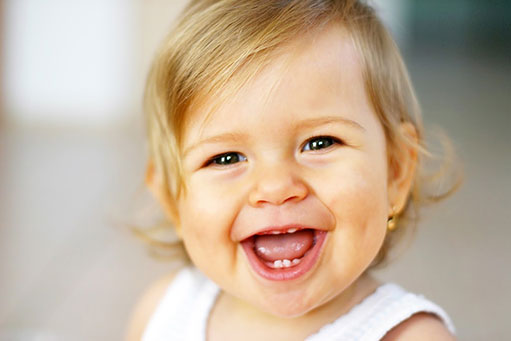
Many parents celebrate their baby's first tooth as a major milestone in the child's growth and development, and rightly so. However, these early teeth, commonly known as baby teeth, milk teeth, or deciduous teeth, only remain in the mouth for a certain number of years, paving the way for the permanent adult teeth that follow.
If you've just welcomed your first baby to your family, you may not know a great deal about the fascinating world of baby teeth, from their normal development patterns and threats to their wellbeing to how they influence the health and growth of permanent teeth. Expand your knowledge to include these five helpful facts.
1. Children Only Develop 20 Baby Teeth
Don't assume that your child will sprout the same number of baby teeth that you'd expect to see in an adult mouth. Even though these teeth actually start forming during the fetal stage, your baby's first tooth may not erupt until the age of six months to one year. Even a full three years of development will only yield 20 teeth in all.
The first of these 20 teeth erupt at the front of the mouth, with the final baby teeth erupting as molars. The first teeth to come also make their exit first, falling out as their roots dissolve and permanent teeth take their place. This replacement process usually starts around age five and may continue until the age of 12 to 14.
2. Baby Teeth Cause Teething Pains
Baby teeth can make their appearance in a child's mouth only by first pushing their way through the gum tissue. This teething process can prove highly upsetting for your baby. Expect a certain amount of irritability, crying, drooling, ear pulling, swelling of the gums or lips, and an apparently obsessive urge to chew on things.
Fortunately, you can ease your child's teething woes somewhat during this necessary transition. For instance, breastfeeding appears to soothe babies upset by teething. If you worry about bites from the baby teeth, you can give your baby ice cubes of frozen breast milk for a combination of nutrition and natural pain relief.
Other safe ways to ease teething discomfort include letting your baby gum a chilled washcloth, cold foods, teething biscuits, or a rubber teething ring. Don't apply a teething gel to your baby's gums or give your baby pain-relieving medication without first asking your pediatric dentist about potential risks and side effects.
3. Baby Teeth Require the Same Care As Permanent Teeth
Don't take the temporary nature of baby teeth as permission to disregard your little one's dental hygiene. Baby teeth can suffer from cavities and infections just as permanent teeth can. These conditions can not only cause considerable pain, but they can also introduce dangerous bacteria to your child's gums and bloodstream.
A cavity that forms in a baby tooth can sometimes spell trouble for the permanent tooth that will someday replace it. Bacteria from a dental infection can easily spread from the baby tooth to the neighboring gum and jawbone tissue, causing a painful problem called an abscess. From there, the infection may invade the permanent tooth.
You can reduce your child's risks for these problems by following a careful program of home dental hygiene. Brush the baby teeth gently with a soft-bristled brush and a pea-sized amount of toothpaste. Teach your child how to brush from an early age. Schedule a pediatric dental checkup according to your dentist's recommendations.
4. Bottles and Thumb-Sucking Can Harm Baby Teeth
Many babies get their nourishment from a bottle without experiencing any dental issues. Bear in mind, however, that any sugary beverage can promote tooth decay even in baby teeth just starting to erupt. Since even breast milk and formula can cause plaque to accumulate, wipe your baby's mouth with sterile gauze after bottle feedings.
Thumb-sucking (along with its close cousin, pacifier sucking) poses a different set of concerns. Children commonly find the sucking action comforting during the first years of life. However, if they continue this behavior after their permanent teeth start to erupt, those teeth may lose their normal alignment and create bite problems.
You may find that a combination of distraction and positive reinforcement (as in rewards for not sucking on a thumb or pacifier) may help your child break the habit. Meanwhile, keep a close watch on your child's teeth for any signs of alignment problems and ask your dentist about any additional strategies worth considering.
5. Baby Teeth Can Interfere With Permanent Tooth Eruption
Baby teeth act as spacers, setting the stage for the permanent teeth to erupt with the proper positioning and alignment. A baby tooth that falls out prematurely can allow the surrounding baby teeth to drift out of position. A baby tooth that fails to fall out may cause impaction of the permanent tooth behind it.
Your child's dentist may recommend orthodontic correction for any alignment errors that might stem from early baby tooth loss. If a stubborn baby tooth threatens the wellness and alignment of permanent teeth, your dentist may recommend extraction of the baby tooth so nature can take its normal course.
The team at Dentistry for Children & Adolescents can serve as your information resource for your child's dental wellness, including issues involving baby teeth. Contact us today to learn more and schedule an appointment for your newest family members.
